On Primary Candidacies
Thinking about what is predictive as well as the usefulness of historical case studies.
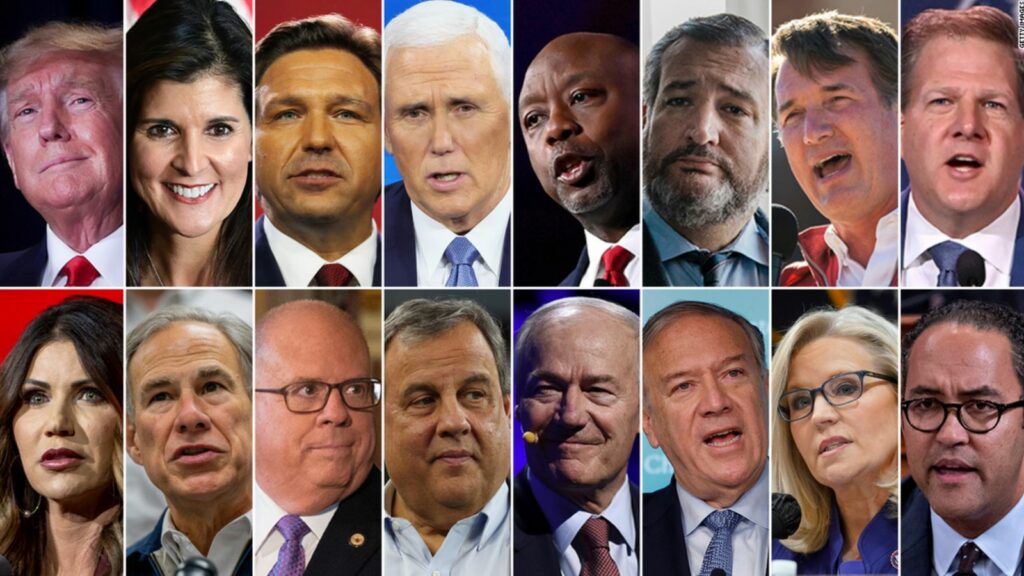
So, my post yesterday both created a lot of conversation, but also made me want to further examine the empirical question of the predictive power of polls at this stage of the process. Specifically, I am interested not so much in how well polls predict winners (although the answer is “pretty well”) but rather in the question of how well they predict losers–especially candidates who poll in very low numbers (basically sub 5%). I think it is a useful question both for those who simply want to understand the probabilities, but also as a reasonable question for candidates and their campaigns to ask themselves
I typically proceed from the notion that it is not that hard to predict who is likely to fail in these nomination processes. I am fairly certain that if a candidate is polling in the single digits, especially sub-5%, the odds are incredibly high that that candidate will not win the nomination.
Yes, candidates for the nomination are often egotistical enough (or flat delusional enough) to assume that they can beat the odds. But, I also have to think that they know full well what their chances are and often have to have other motivations apart from a rock-solid assumption that they will win. After all, give me a group of golfers at a given major tournament and I expect most of them will say that they can win, and maybe, just maybe, they can. But anyone with any level of knowledge can tell you which ones really don’t have a chance outside of a true miracle.
This is another way of saying that, sure, “anything can happen” but it is also pointing out that there are clear patterns and the probabilities are what they are.
Likewise, when making comparisons as evidence to back a position, it is necessary to keep in mind the context of a given race. Some in the comment thread asserted “no one thought Barack Obama could win in 2008.” Well, I am not so sure about that. From a purely anecdotal level, I personally remember watching Obama’s 2004 Democratic National Convention speech and thinking that he was clearly auditioning for national office and that I expected to see him in the mix (although perhaps not in 2008!). Keep in mind I was voting Republican at the time.
But my recollections aren’t data. So, let’s look at some polling from roughly this time of the year in 2007 (RT Strategies National Omnibus Poll done in partnership with the Cook Political Report).
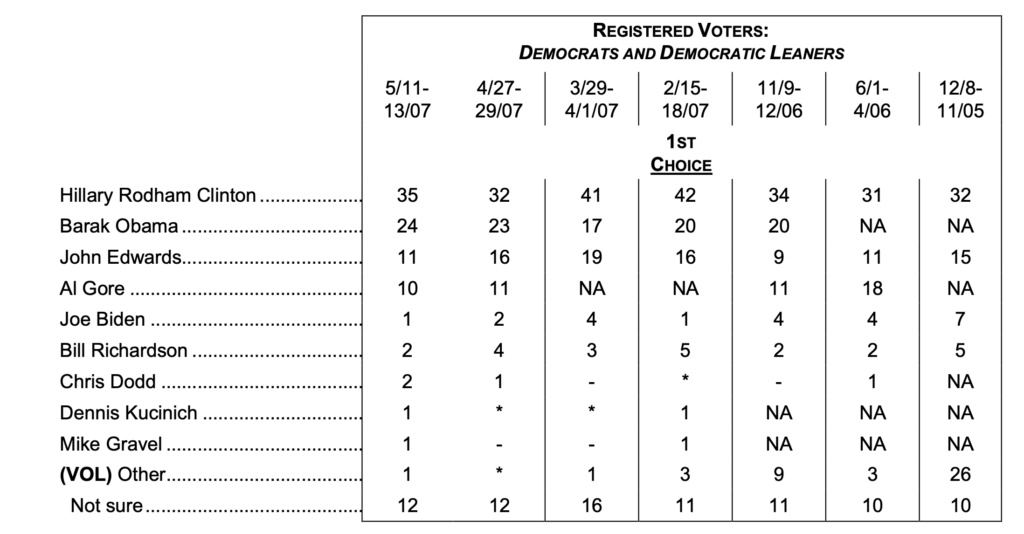
There is more at the link (including the fact that Giuliani was leading McCain at the time).
So, the Pence/Christie/etc. the analogy to 2008 is not Obama, the analogy is to Richardson, Kucinich, and Gravel. Indeed, the crude Obama analogy for this cycle is DeSantis (but that is an imperfect fit given Trump’s lead in the polls and his status as ex-president–as well as his various legal challenges).
Another case that was raised was Bill Clinton, who is a far better example of a candidate who rose from the basement. I will say this: 1992 does make the case that unusual circumstances can upset the nomination applecart, but that also means it isn’t a good case for making predictive comparisons. To wit: in 1991 the sitting President, George H. W. Bush was still riding high in the approval polls and looked to be a shoo-in for re-election. This definitely affected which Democrats decided to run for the nomination.
Via Gallup. Note that if you were a Democrat trying to decide whether to run for the 1992 nomination, you were doing so at a time in which Bush had record (at the time) approval ratings. I always think of this SNL sketch as a great example of the political zeitgeist.
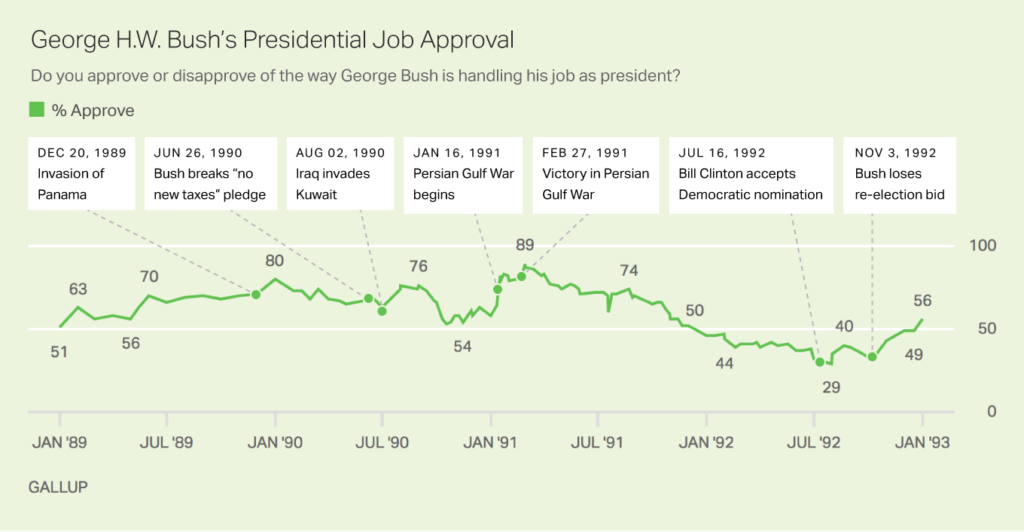
Now, I do understand that 2024 could end up being an anomalous year for the GOP given Trump’s ongoing legal woes. Still, the notion that Pence or Christie (or any number of the other contenders) will be the ones to capitalize on that chaos is still far-fetched.
A note on Trump in 2016: my mistake there was not taking his numbers seriously once he entered, not that he entered the primaries with very low numbers (Trump announced on June 16, 2015–note his poll numbers a month later).
Regardless of specific examples, let’s turn to a 2019 FiveThirtyEight piece: We Analyzed 40 Years Of Primary Polls. Even Early On, They’re Fairly Predictive.
…what we’ve seen is that national surveys conducted in the year before a presidential primary are relatively good indicators of which candidates will advance to the general election, especially when polling averages are adjusted to reflect how well known each candidate was.
Another piece did provide this caveat:
Early national polls conducted in the year before the first nominating contests do have predictive value, but remember there isn’t one national primary. Instead, parties choose presidential nominees via state-by-state elections over the course of a few months. And that sequential nature of the primary makes it hard for national polls to capture all the dynamics of the race — a candidate falling short of expectations in Iowa or unexpectedly winning both Iowa and New Hampshire can swiftly alter the playing field for the remaining primaries.
I think that is certainly worth remembering. However, my question here is not predicting the winner, but looking at how well polls predict losers.
I would also point to the year-by-year breakdowns in these two FiveThirtyEight posts:
- What More Than 40 Years Of Early Primary Polls Tell Us About 2020: Part 1.
- How Early Primary Polls Foreshadowed Surprises Like Obama’s Rise And Trump’s Win.
To my general point about incredibly low (sub 5%) polling meaning the kiss of death even at this stage. I will note that the analyses cited break the years down into the first half and second half. We are technically still in the first half of this year, but only barely. So, yes, there are examples of first-half single digits becoming robust numbers in the second half (this would likely be linked to announcements as well). So there is some hedging that is relevant depending on whether June is truly a “first half” situation. (Also the difference between potential candidates and actually announced candidates).
Still, I would note that Democratic candidates who truly went from the basement to the nominee were McGovern (1972), Carter (1976), and Clinton (1992). Republicans have mostly stuck with the leader and there is not a great example of a nobody winning their nomination.
I would note that using the primaries to determine the nomination was a new thing in 1972, and polling was not what it is now, so I am not that surprised by 1972 and 1976 being where we would find anomalies. I discussed Clinton above, but will share this and note that a large number of people in these polls never ran (notably Cuomo, Wilder, Jackson, Gephardt, Gore, and Bentsen).
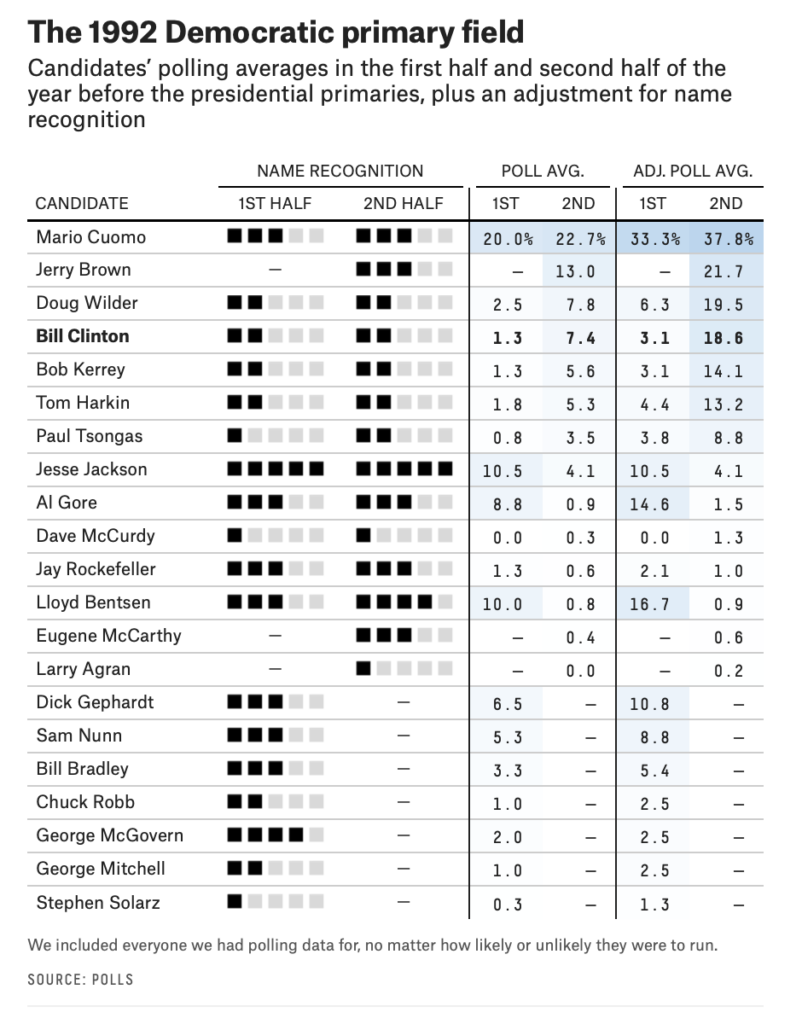
At any rate, history does show that there are odd outcomes, but the overall data show that if you are in the single digits at this stage, especially as an announced candidate, you are probably toast.


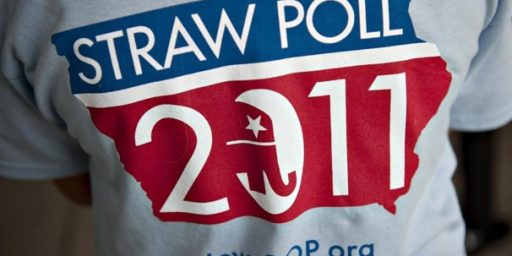

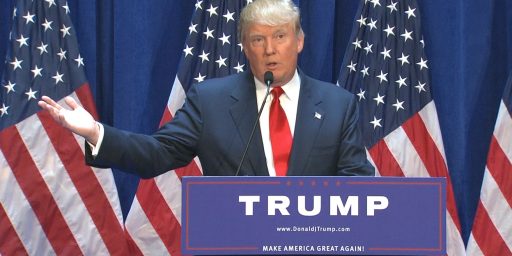
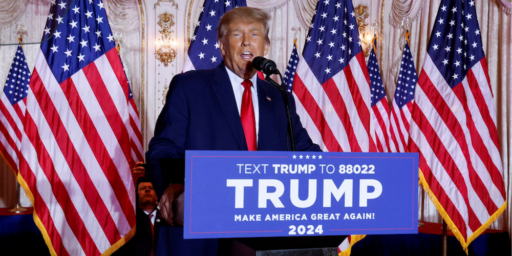
Among those, I think the nomination of Carter was the only true example of a black swan event. He just sort of came out of nowhere and started racking up primary wins. McGovern was involved in the commission that birthed the modern nomination process in 1972, and he knew what to do to take advantage of it. (Also, the Nixon Admin was busy putting its thumb on the scale to make sure McGovern was the nominee.) Clinton, as we’ve mentioned, benefited from all the big names (except Jerry Brown, who was considered a bit of an oddball) passing on running.
@Kylopod:
I think that is correct.
I have read, don’t know how true, that Clinton did not (initially) expect to win in 1992 – he was trying to build name recognition to help him compete for the 1996 nomination, assuming Poppy would be reelected.
Benito is essentially the GQP incumbent, as far as the base is concerned. I think the last such situation would be Grover Cleveland, and that’s a hard comparison. Teddy Roosevelt also ran after having left the White House, but in a different party.
Unless he’s forced off the race by the legal problems he worked so hard to get into, or there’s some shocking development that turns the deplorables against him*, I can’t see anyone else winning. Especially not when the rest seems unwilling to get down into the mud and wrestle the Orange Ass.
*Yes, I know. but if he did something completely beyond the pale, like calling for equal rights for all, or saying higher taxes are necessary to balance the budget, or something else both correct and moral, that might do him in.
@Kathy:
A huge–excuse me, yuge–part of the problem of getting down to Trump’s level is that no one really can. Just when you think he’s reached the utter nadir of oafishness, he goes even deeper. No one can out-churl him.
@Kathy:
He’s said both of those things before. He’s claimed to call for higher taxes on the rich, even as he was passing a bill that did the opposite. He’s attacked DeSantis for supporting cuts to Medicare and Social Security. In 2016 he held up an LGBT banner and said that trans people should be allowed to use the bathroom of their choice.
And he supports the Covid vaccine. So far.
I don’t think the economic stuff matters to the base one iota, and they’ve given him a fair amount of latitude even on some of the culture wars. Now, maybe if he called for open borders, or confiscation of firearms, that might start to get their attention. Or maybe not.
@Kylopod:
Didn’t Trump once call for the confiscation of firearms after one of the mass shootings? He said something along the lines of “take the guns and then have due process.” He’s also waffled on abortion, and desperately wants to take credit for the Covid vax, even while his fans are calling it “the clot shot.”
What unites the Trumpkins behind him is their belief that “he fights,” whatever that means, and that he loves them and this country.
@Kylopod:
The thing with benito is not what he says a few times, but what he says over and over. Things like the wall, lock her up, etc.
Or maybe the kiss of death will come when he takes responsibility for his many failures.
The bottom line is he can admit to incest and cannibalism, and shoot DeSatanis during a public debate, and his base would deny, cheer, or ignore as directed.
@CSK:
Probably the second* most valuable thing I learned over many, many years of ultimately pointless internet debates, is not to let the opponent set the rules of the discussion. In part this involves ignoring or suppressing the natural tendency to respond to specific questions asked, or to points raised. This is tricky, as it can appear evasive.
With Benito, the objective is to make him look weak, insecure, or stupid. And to put him on the defensive. It’s not easy, because he will never admit a mistake or show any shame. But failure to even try guarantees complete failure to take him down.
*The first is to walk away from ultimately pointless internet debates.
As to how this relates to OTB, I’m here because the debate is not pointless.
@Kylopod: Another part of the whole notion of Trump alienating the MAGAts is the take what he says “seriously but not literally/literally but not seriously” blatherskite.
In the 1992 cycle, it was expected that Mario Cuomo would run, and would snatch up the nomination. It was only after he decided not to run, at the last possible moment before registering for NH, that the Democratic field began to reshuffle. And then we learned about Tsongas’s cancer.
If Trump collapses (politically or physically), I think that year would be a very good analogy.
If it’s not Trump, it will be someone polling in single digits.
Probably not Mr. North Dakota, who has the weird situation of being the less appealing (to Republicans) governor of a Dakota.
@Gustopher:
IMO, DeSatanis is the must Cheeto-like of the non-Orange candidates. So it will be up to the base to doublethink their way into embracing him as a savior after being the worst person in the world for a few months.
Partly it will depend on what, if anything, Benito says about him after he withdraws. If he dies or is incapacitated, he probably wont have much to say.
@Kathy: If Trump dies, it’s as certain as the sun rises that there will be people claiming DeSantis killed him.
@just nutha:
Oh, yes. One of Trump’s superpowers is that everyone knows he’s a bullshitter, so his supporters assume he’s bullshitting whenever he says something they don’t agree with.
@Kylopod:
Most likely a cabal of deep staters will be blamed as the assassins, because they’re terrified of him.
@CSK: The fun thing about conspiracy theories is that you don’t have to be restricted to a single culprit. Some of those who think Kennedy was offed by the CIA also think LBJ was involved. I’m sure there’d be some implicating both DeSantis and Biden in the web.
Since it’s on topic for this thread, Trump just announced on Truth Social that he has been Federally indicted and will appear in a Miami Federal court next Tuesday.
This type of advanced disclosure from the former President fits the pattern of the NY indictment. No word on what he will be charged with.
One more note, with the NY indictment, Trump initially announced it was happening but without a date. The fact that there is already apparently an appearance date makes this feel like a done deal.
Also, because he has to appear in Miami, then this will be related to the document case and the Mar A Lago raid. Anything related to 1/6 would involve appearing in front of the DC Federal Court.
I think this is mostly right.
In the other thread, I tried to emphasize the fact that in this particular race, there are so many GoP candidates with single digits numbers because Trump has 50-60% and DeSantis has another 25. Mathematically, other candidates are going to be in the single digits.
And this early Trump dominance is relatively rare, with roughly twice the support of a typical leading candidate at this stage. The only other example I could find was Dole, who had about 50% early in the process. Trump isn’t Dole, and while this is definitely Trump’s nomination to lose, the chances of him imploding are not zero.
So it’s not irrational or necessarily entirely egotistical for the people to join the race knowing what Trump’s numbers are if they are making play to be positioned for Trump should stumble. Because if he implodes, a good chunk of that 50-60% will go other candidates, and then the race will be much more competitive.
I remember in August 2015 predicting here Trump would be nominated and everybody piling on telling me I was blind, naive, stupid, demented for saying that. It’s gonna be JEB! It will be JEB! It’s in the can, predestined, foreseeable.
It wasn’t, was it?
It’s about cultural resonance and zeitgeist and personality.
And also height and perceived attractiveness. The taller person wins almost every time. It’s American Idol with a tiny bit of policy preference.
@Kylopod: @Steven L. Taylor: I would also note that Jimmy Carter’s run was during a wildly different media environment and national political structure. CNN didn’t launch until 1980, and it was quite a while after that before it really took off. There wasn’t anything like the massive fundraising requirements that exist now, either. Carter is where the myth of Iowa and New Hampshire really took off.
@de stijl: The history of the modern GOP pre-Trump was that the crazy candidates started off strong but plummeted as the base rallied around a normal candidate. So, most of us thought the same would happen with Trump. (Joe Scarborough was one of the few national pundits who thought he had staying power all along.) But it’s true that Trump was in the low single digits when he announced June 15, 2015. He was leading the field a month later and never looked back.
I still think the normal pattern would have held if Bush, Rubio, Kasich, and Cruz had put together a coalition and gotten behind any of them. But there was no obvious “it” candidate among them and they all hung around too long.
@de stijl:
Almost every time, except when they don’t. Romney was taller than Obama; Kerry was taller than Bush; Gore was taller than Bush (well, okay, did he really lose?); Ford was taller than Carter. (Biden is definitely shorter than Trump’s claimed height of 6’3″, though Trump is almost certainly lying; that said, Biden is probably still slightly shorter than Trump. But I can’t find any photos of the two standing together. They didn’t do the traditional hand-shake during the 2020 debates, for obvious reasons. There are photos of Trump standing next to 6’1″ Obama and they look to be the same height, and Obama is slightly taller than Biden.) It’s true that US presidents tend to be taller-than-average men, but that isn’t necessarily about which of two major-party nominees wins the general. The nominees themselves tend to be taller-than-average men. You might say the parties tend to choose taller candidates as their nominees (and for the record, Jeb, who is actually 6’3″–and I believe him–was visibly taller than Trump on the debate stage in 2015-16), but there may be other, indirect reasons, such as the fact that presidential nominees have tended to be wealthy and of Northern European ancestry. The common belief that voters associate height with leadership makes sense, but at bottom it’s just a correlation.